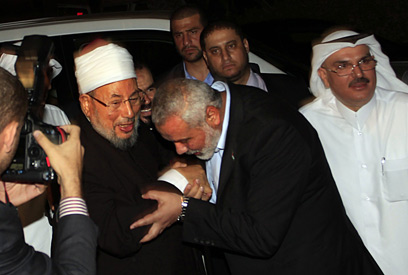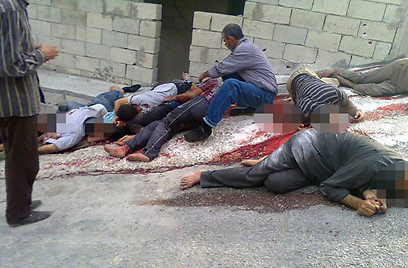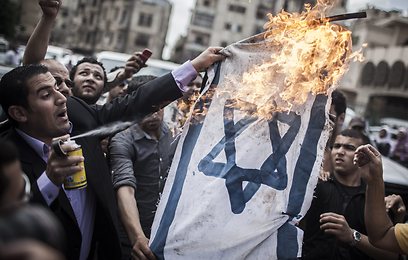
Assad butchers, Israel still blamed
Op-ed: Despite atrocities committed by Syrian regime, alleged Israeli airstrike united Arab world against Jewish state
Since the revolution in Syria began, many Israelis, Jews and Arabs alike, have been mulling over whether Israel should intervene in the civil war there. The Arabs, Sunnis, Christians and Druze are watching their brothers across the border being butchered or becoming refugees. The Jews are reminded of the world's indifference during the Holocaust. The alleged Israeli airstrike gave us a definitive answer. It was as though the rival sides took a break from the mutual killing and recalled their common denominator – the hatred of the "Zionist enemy."
The Arab world is finding it very difficult to come to terms with the Israeli intervention in Syria, as it put a spotlight on the intolerable truth: Despite a death toll nearing 100,000, the Arab world is not really intervening in a massacre that is occurring in the heart of the Islamist nation.
The Arabs barely accepted the fact that an Arab army is butchering the Syrian people, and now they find out that only the "Zionist enemy" dares to hurt the murderous regime. Where is the Turkish army, which is armed with the most advanced American weaponry? Where is Egyptian President Mohamed Morsi, a member of the Muslim Brotherhood, who has the largest Arab army in the Middle East at his disposal? Can't the Arab and Islamic world defeat a small Syrian army run by a minority Alawite sect that is aided by Hezbollah?
Muslim leaders leveled harsh criticism at Israel during the week that followed the airstrike. Among the critics were politicians, leaders of national and Islamist organizations and muftis (Muslim scholars who issue religious Sunni edicts) who used to condemn the regime in Syria and have now turned their arrows in Israel's direction.
The Grand Mufti of Lebanon, Mohammed Rashid Qabbani, called the airstrike "Zionist terror," and at Al-Azhar University, the heart of the Sunni world, Muslim Brotherhood members absurdly protested the bombing of the Assad regime forces. They also protested against Jewish worshippers at the Temple Mount and the arrest of a Palestinian mufti in Jerusalem.

Qaradawi (L) with Hamas' Haniyeh in Gaza (Photo: AFP)
The protest over the mufti's arrest is understandable, but how can the protest against the Israeli attack be explained, when it was directed against the sworn enemies of the Muslim Brotherhood – Assad's army and Hezbollah? The leaders of the movement offered an unconvincing excuse, according to which Israel was taking advantage of the Arab revolutions and Egypt's weakness in particular to bomb Syria.
In Jordan, pro-Syria leftist groups also held protests against the Israeli strike. An article published by the editor of the Al Quds Al Arabi newspaper claimed that the atmosphere of jihad created in Jordan against Syria has affected the Jordanians' attitude toward Israel and encourages aggression against the Jewish state. This pressure will increase once the jihadists who are fighting in Syria will return home to Jordan.

Bodies in Banias, Syria (Photo: AP)
In Gaza, members of the Popular Resistance demonstrated against the Israeli strike but also against the jihadists, thus embarrassing the ruling Hamas movement. They protested against the visit of Sheikh Yusuf Qaradawi, a veteran leader of the Muslim Brotherhood who is respected throughout the Sunni world. While in Gaza, Qaradawi spoke against the "Zionist entity," but he was criticized for what he did not say. During his speech, Qaradawi did not specifically call for a "jihad" against Israel, while he did urge a holy war against the Syrian regime. The Shiite Al-Manar television network said the sheikh was collaborating with America. Hezbollah said that in a speech he delivered before the Israeli attack, he gave it religious legitimacy.
Despite Hamas' position in support of the Muslim Brotherhood in Syria, the Islamist group also criticized the "Israeli intervention in Syria's internal affairs." Hamas spokesman Fawzi Barhoum called on the Arab world to "unite against Israel's efforts to destroy Syria's military infrastructure." Is this not the same army that is committing the atrocities against the Sunni majority in Syria?

Anti-Israel protest in Egypt (Photo: EPA)
Criticisms against the "Israeli intervention in Syria" and the "violation of international law and the infiltration of an Arab country's territorial borders" were also raised by Arab statesmen in the Palestinian Authority, Lebanon and even Turkey.
As expected, the Assad regime's old allies intensified their anti-Israel rhetoric after the attack. Hezbollah vowed to fight for the "liberation" of the Golan Heights, while Iranian army chief Hassan Firouzabadi said his country plans to set up "another Hezbollah" in Syria towards this end.
Veteran terrorist Ahmed Jibril, the leader of the Popular Front for the Liberation of Palestine – General Command, suddenly remembered that he too is interested in the "liberation" of the Golan and promised to establish a unit of Syrian volunteers to help achieve this goal. However, the organization may find it difficult to recruit volunteers after supported the atrocities committed by the "Shabiha" against Syrian civilians.
Assad's allies have been repeating the phrase "Zionist spring" as a way of redefining the great conspiracy theory that emerged in March 2011, according to which the US and Israel, with the help of Turkey, Saudi Arabia and Qatar, were responsible for the Arab revolutions aimed at destroying the Arab countries in general - and Syria in particular – so it would be easier to control them. Facebook and Al-Jazeera are described as tools of the "mock revolution." Hezbollah considers the Muslim Brotherhood and the other so-called "moderate Islam" Sunni elements (such as the rulers of Turkey, Egypt and Tunisia) as being part of this conspiracy.
The week that followed the alleged Israeli airstrike proved that Israel acted wisely when it refrained from intervening in the Arab revolutions. Many of us thought the "Arab Spring" would open the eyes of the Middle East's citizens and prove to them that the Arabs' real enemies are the oppressive and corrupt Arab regimes. But two years of bloody Arab revolts did not change anything in the Arab world's attitude toward Israel.
Dr. Yaron Friedman is a graduate of the Sorbonne. He teaches Arabic and lectures about Islam at the Technion, at Beit Hagefen and at the Galilee Academic College. His book, the Nusayri Alawis: An Introduction to the Religion, History and Identity of the Leading Minority in Syria, was published in 2010 by Brill-Leiden










